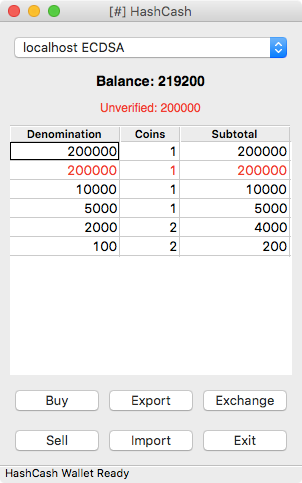Real Digital Cash
The world's first private and permissionless digital cash system.

News
| Dec 23, 2018 | Crypt::HashCash v1.130 released | |
| Oct 16, 2018 | Crypt::HashCash v1.129 released | |
| Mar 11, 2018 | Crypt::HashCash v1.128 released | |
| Sep 16, 2017 | Crypt::HashCash v1.127 released | |
| Jun 24, 2017 | Crypt::HashCash v1.126 released | |
| Jun 10, 2017 | Crypt::HashCash v1.115 released |
-
"Very awesome. This is a much more elegant way to represent "off chain" balances."
— Balaji Srinivasan
-
"Interesting."
— Naval Ravikant
-
"It's starting to feel like 1997 all over again!"
— Riccardo 'fluffypony' Spagni